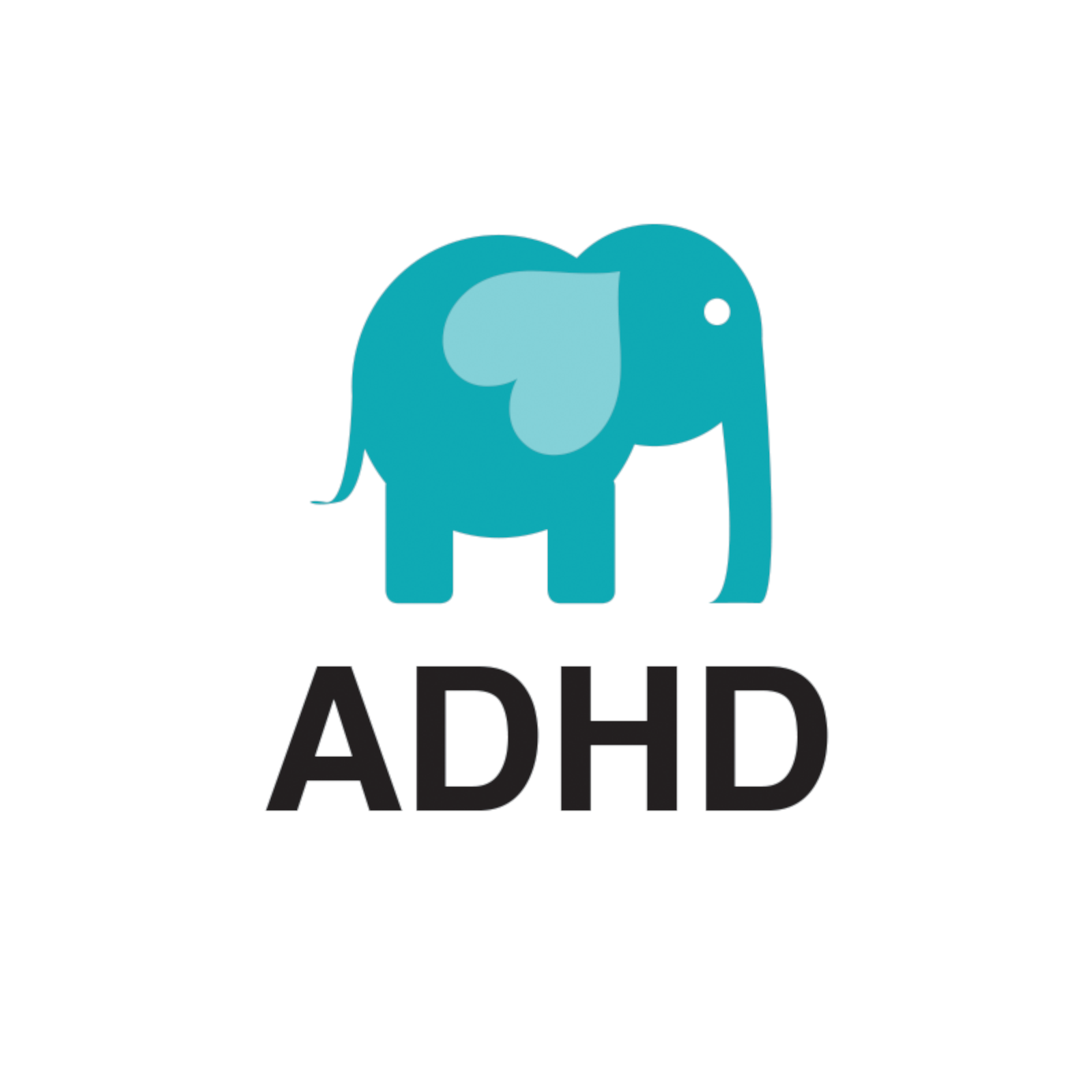
818.3K
Downloads
213
Episodes
Drawing on years of experience working with families, Parenting Coaches Siope Kinikini and Kimber Petersen share how families can improve, heal, and find success using the proven methods of the Teaching-Family Model. Visit smarterparenting.com to learn more.
Episodes
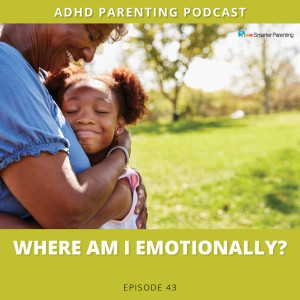
Wednesday Nov 20, 2019
Ep #44: Where am I emotionally?
Wednesday Nov 20, 2019
Wednesday Nov 20, 2019
Before being able to teach behavior skills effectively, parents need to ask, "Where am I emotionally?" Understanding where they are emotionally is vital in teaching your kids. Remember, our first role is parents as teachers. If we are frustrated, angry, upset, or stressed, we aren't effective in helping our children change their negative behavior.
Parents need to take time to make sure they are emotionally aware. It can be difficult when we are dealing with situations that can be stressful. It may mean taking a few minutes to decompress, allowing yourself a treat, breathing exercises, or going for a walk, etc. Each of us will have a different way to regulate.
Asking ourselves, "Where am I emotionally?" allows us to approach teaching behavior skills without the emotions that would sabotage and to be aware of what behavior skill we need to teach our child. Being calm allows us to walk our children through the steps of behavior skills. It's using the steps where change happens. If you want to be successful in changing negative behavior for positive behavior, you have to use the steps of the behavior skills found on SmarterParenting.com. We can't stress enough that change happens when using the steps. Learn the steps of the behavior skills if you want to see change happen in your family.
Raising children isn't easy. Children have their own thoughts, feelings, and emotions. Dealing with those can be hard if we aren't emotionally aware of where they and we are. If we are angry, stressed, or frustrated, often we pass those feelings onto our children and make the situation worse. The same goes for our children. Understanding where our children are emotionally makes teaching behavior skills more successful. If they are frustrated, angry, or upset, they won't be in a place to learn or make changes.
Learning behavior skills require patience, but the payoffs hard massive. The behavior skills found on Smarter Parenting help parents make the changes: https://www.smarterparenting.com/lesson/
Need help implementing behavior skills? Join the Smarter Parenting Club. https://club.smarterparenting.com/
For full show notes and transcript visit: https://www.smarterparenting.com/adhd-parenting-podcast/
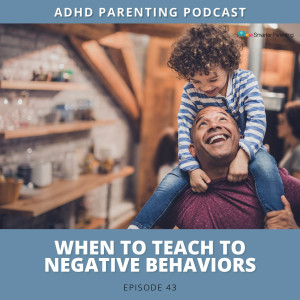
Monday Nov 18, 2019
Ep #43: When--teaching to negative behaviors
Monday Nov 18, 2019
Monday Nov 18, 2019
Today’s podcast covers the when pillar. In implementing new teaching, parents ask, “When is a good time to teach behavior skills to address problems?? The answer: As soon as possible.
The object of any corrective teaching is to bring a child back to a non-escalated state as quickly as possible.
By teaching to the negative behavior as soon as possible, you keep the problem from escalating. The longer you wait until you address the behavior, the more work you have to do to correct their behavior.
Each of us has a tolerance level of what behaviors we will accept before intervening. For some parents, they have a very low tolerance level and step in very early on to address problems. For other parents, they have a very high tolerance level and will only step in after things have gotten way out of hand.
We should work to have low tolerance levels as having low tolerance levels makes life more comfortable and improve relationships with our kids.
What does this acttually look like?
Your son is playing with your daughter, and she takes his toy. Because you have a low tolerance level, you would intervene at this point and work to deescalate the situation.
What if you don’t step in? Think of what happens next. Your daughter has taken another toy. Now your son is not only crying, but he’s also starting yelling and getting angry. He tries to grab the toy from his sister. She’s teasing him and holding the toy away. His frustrating level has now reached a breaking point, and he starts hitting his sister.
Do you see how much more corrective you need to do to address the situation because you waited to step in?
How long will parents need to teach new behaviors? As long as it takes. There is no magic formula as you’re working with children who have their own thoughts, feelings, and personalities. It may be frustrating if the change is slow. Keep at it. Eventually, you will see a return on your investment.
The behavior skills that parents need to teach their children come from the Teaching-Family Model and can be found on SmarterParenting.com.
For full show notes and transcripts visit: https://www.smarterparenting.com/adhd-parenting-podcast/
Join the Smarter Parenting Club. https://club.smarterparenting.com/
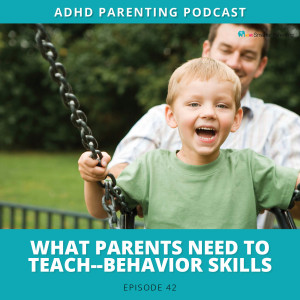
Wednesday Nov 13, 2019
Ep #42: What parents need to teach--behavior skills
Wednesday Nov 13, 2019
Wednesday Nov 13, 2019
The third element of ADHD Parenting Coaching is what. What should I teach to help my kids be successful and create a better family life? The answer to the question is simple. Parents should be teaching behavior skills. Behavior skills set expectations and allow families to build strong bonds. Behavior skills make parents’ lives more comfortable as they reduce frustration, anger, and feelings of hopelessness.
In the 1960s, 20 million dollars of research was done into successful parenting techniques. The study found was that successful parents did very similar things. Sometimes parents understood what they were doing, and other times they didn’t. Researchers determined that parents could be taught how to be successful parents and the behavior skills of
Teaching-Family Model was born. The behavior skills of the Teaching-Family Model are parenting guides that give parents the steps and words they need to implement the skill successfully.
Each behavior skill is on SmarterParenting.com is broken down into concrete steps. These steps help parents know what to do and how to do it. Each behavior skills creates a different outcome.
For almost 60 years, parents, teachers, therapists, and other personnel have used the Teaching-Family Model to help kids and families find success. It works! Studies have confirmed that teaching behavior skills are possible and create favorable outcomes.
The goal of using behavior skills is to teach your child how to navigate the world without you. The steps of the skills are pretty straightforward. Sometimes parents struggle in the implementation of them and need some help with parenting skills
ADHD Parenting Coaching allows our ADHD expert, Siope Kinikini, to look at your family's needs and determine a tailored action plan.
Sign-up for a free 15-minute mini-session and watch the behavior skills of the Teaching-Family Model transform your life.
For full show notes and transcripts visit: https://www.smarterparenting.com/adhd-parenting-podcast/
Join the Smarter Parenting Club. https://club.smarterparenting.com/
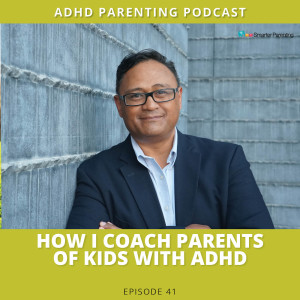
Monday Nov 11, 2019
Ep #41: How I coach parents of kids with ADHD
Monday Nov 11, 2019
Monday Nov 11, 2019
ADHD parenting coach, Siope Kinikini, is often asked how he coaches parents and families. In episode 41, he walks through what an ADHD Parenting Coaching session looks like using the five elements of the Teaching-Family Model.
The five elements of the Teaching-Family Model are: What, where, how, when and
Many parents ask, “What do I do” but that question is too open to be useful. The first element, “What skills am I going to use?” allows parents to start looking specifically at issues and find solutions.
Element two is, “Where am I teaching this?” A parent needs to look at where in their schedule would teaching be most effective. It also means looking at where is my child’s understanding and teaching to that to create success.
Element three is, “How do I teach?” The behavior skills on Smarter Parenting answer how as they have specific steps that outline how parents should respond. These steps take out the guess-work and help parents focus on repairing relationships.
Element four is, “When do I know if they understand?” It will take some time, which is why Role-playing or practicing is vital to help them learn new behaviors. You’ll know they understand what you’re teaching when they’re able to do it multiple times on their own.
Lastly, element five is “The Why.” Why are we so passionate about helping families? We want to strengthen families and show parents how to raise kids that can navigate the world around them.
The behavior skills taught on Smarter Parenting helps parents accomplish these five elements. Which, in turn, reduces stress and anger and improves communication and relationships.
Sometimes we all need a parenting friend to help us. If you need some individualized help, we would love to help with ADHD Parenting Coaching. Where we will go into details with the problems your family is facing and determine an individual course of action that will allow you to get the outcomes you want. We want all parents to be able to take advantage of the opportunity to be coached and offer free 15-minute mini-session.
Join the Smarter Parenting Club. https://club.smarterparenting.com/
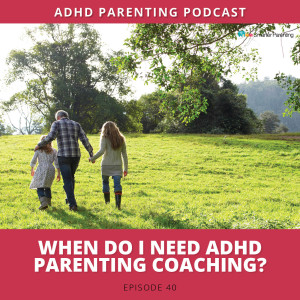
Wednesday Nov 06, 2019
Ep #40: When do I need ADHD Parenting Coaching?
Wednesday Nov 06, 2019
Wednesday Nov 06, 2019
There is no shame in having an ADHD Parenting Coach. We recommend getting ADHD Parenting Coaching long before issues become significant problems.
What is a parenting coach? A parenting coach is an objective person who can give you parenting skills and help you find positive parenting solutions to the challenges your family is facing. Our parenting coach, Siope Kinikini, will guide and encourage you. He will point out what you are doing well and ways you can harness your strengths. He is not there to shame you or make you feel bad. Our end goal with an ADHD Parenting Coaching session is to help heal and elevate your family using the elements of the Teaching-Family Model.
All parents could use a parenting coach as raising kids, whether they have ADHD or not, is tough. We believe in the power of a parenting coaching session and offer free 15-minute mini-sessions to help you see how much an ADHD Parenting Coach can help. Sign-up today and let our master teacher help your family.
For a free 15-minute mini-session: https://www.smarterparenting.com/coaching
For full show notes and transcript: https://www.smarterparenting.com/adhd-parenting-podcast/
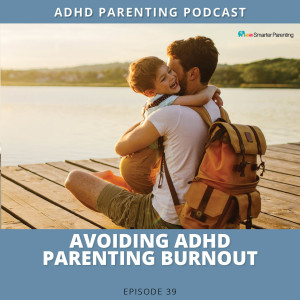
Monday Nov 04, 2019
Ep #39: Avoiding ADHD parenting burnout
Monday Nov 04, 2019
Monday Nov 04, 2019
ADHD parenting burnout is real. As parents, we want to be there for our child. Often that comes at the expense of our health and ability. By giving your child your all, you become a less effective parent.
Parents need to take precautions to avoid ADHD fatigue and to acknowledge when they are feeling overwhelmed or dealing with parenting stress. ADHD parenting coach, Siope Kinikini, shares five solutions that will help all parents avoid burnout and be the parent they want to be.
The five solutions are: set boundaries, prioritize self-care, find a support group, understand ADHD diagnosis, and establish traditions.
The most important thing a parent can do to avoid ADHD parenting burnout is to establish boundaries. Boundaries are necessary. Boundaries help us establish expectations and expectations equal happiness. Happiness is the ultimate goal as it means we are doing our job as parents and providing our kids the love and support they need.
We know it can be hard to establish boundaries with a child with ADHD because they need us more than other children. They need more reminders to do things. They need more instructions, which is exactly why they need boundaries. They need to learn how to function in the world without you. Boundaries teach them how to. Boundaries will change as they grow, and it’s okay to adjust those boundaries as this happens to prevent ADHD parenting burnout.
Part of establishing boundaries is prioritizing your self-care. That means setting boundaries on time and things that are yours. Whether that’s exercising, taking a bath, reading a book, or eating ice cream they don’t have access to, find those things that allow you to recharge and feel fulfilled.
Many parents feel guilty about having self-care routines. Don’t! Your capacity to care for your kid with ADHD has a direct correlation to your self-care. You can not be “on” 24/7 without eventually reaching a breaking point as always being “on” creates anxiety and frustration.
Each parent’s self-care will look different so find what works for you. We know that finding time for self-care can be challenging. It’s okay to schedule your self-care. For some parents, it may be 30 minutes all at once. For others, that time may be broken up into small increments throughout the day.
Third, have a support system you can turn to when you’re feeling overwhelmed or dealing with parenting stress. Being a parent of a child with ADHD can feel very isolating as not everybody can understand the challenges you and your child face. Find someone who does, whether this is a friend, family member, or a support group online.
Sometimes our need for support may extend beyond a friend or support group, which is why we offer ADHD Parenting Coaching. During this time, ADHD Parenting Coach Siope Kinikini, can focus on the unique challenges your family is facing and provide tailored solutions that will improve your family.
Fourth, learn about ADHD. This one may seem out of place, but the more you can understand ADHD, the better able you are to understand your child. When you can understand your child, you have greater empathy, and that allows you to put behaviors into perspective and better manage expectations as to what is realistic and what is. When we don’t have realistic expectations, it can increase levels of frustration and anger as reality doesn’t match the expectation we’ve set.
Lastly, establish traditions. Traditions build relationships and show your child that you are on their side. Traditions don’t have to be elaborate or costly. They need to work for you and your child. Having your child establish traditions allows them to have a say, which allows for greater buy-in. If a tradition isn’t working, don’t force your child to participate. Remember, the purpose of a tradition is to strengthen bonds and forcing participation doesn’t do that. Adapt and grow with traditions as your child grows.
We want all parents of ADHD children to avoid the ADHD parenting burnout. We would love to hear the ways you prevent burnout so we can share with other parents who are feeling overwhelmed. Send your ideas to info@smarterparenting.com.
For show notes and transcript visit: https://www.smarterparenting.com/adhd-parenting-podcast/
Join the Smarter Parenting Club. https://club.smarterparenting.com/
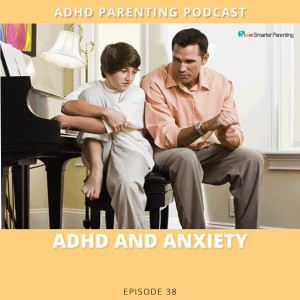
Wednesday Oct 30, 2019
Ep #38: ADHD and anxiety
Wednesday Oct 30, 2019
Wednesday Oct 30, 2019
It is not uncommon for an ADHD and anxiety diagnosis to go hand-in-hand. Multiple diagnoses are called comorbidity. According to the Depression and Anxiety Association of America, 50% of all people with ADHD are also diagnosed with anxiety.
Understanding the likelihood of ADHD and comorbidity allows parents to understand the suggested treatment options better. Especially, when they may focus on treating something other than ADHD first. Your child's doctor will create a treatment plan based on what they feel is the most pressing issue. It is always important to be honest with your child's doctors about all the behaviors you are seeing.
Dealing with ADHD and anxiety can be tricky as often the ADHD or anxiety treatment can increase their feelings of nervousness and worry. We tell parents that it may get worse before it gets better as your child is learning to cope with the changes. Don't give up if it's hard. It also may take some time as adjustments may need to be implemented slowly to keep your child from being too overwhelmed. Your child's doctor will be able to help you work through these challenges.
Having both ADHD and anxiety can increase the feelings of frustration and anger for a child as they often feel like they can't manage either one. Their inability to pay attention often leads to anxiety over not getting tasks done, fear of getting in trouble, or fear of being called to answer a question but what questions was asked.
The behavior skill of Observe and Describe found on SmarterParenting.com, teaches strategies for dealing with anxiety as it allows a child to learn how to identify and process what they are thinking in an impartial and detached way. The basic principle of Observe and Describe is that you observe what is happening, and then you describe what you see. It's taking a mental picture and then describing what is happening in the picture. This process is especially helpful for children with ADHD and Anxiety as it allows them to filter out all the distractions and better focus on what is important.
We want to help your family! We know that dealing with ADHD and anxiety can be overwhelming. We offer ADHD Parenting Coaching that allows focussing on your and your child's specific needs and finding tailored solutions. We are giving away free 15-minute coaching mini-sessions with our ADHD behavioral expert, Siope Kinikini. You'll be amazed at how much insight you'll gain from having an ADHD behavior specialist working with your family.
For full show notes and resources visit https://www.smarterparenting.com/adhd-parenting-podcast/
Join the Smarter Parenting Club. https://club.smarterparenting.com/
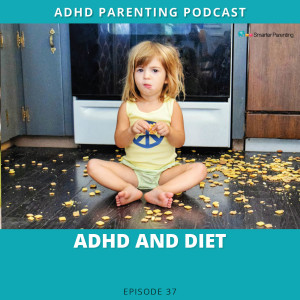
Monday Oct 28, 2019
Ep #37: ADHD and diet
Monday Oct 28, 2019
Monday Oct 28, 2019
When it comes to ADHD and diet, there is a lot of conflicting information about food children should or shouldn’t avoid.
Always consult your child’s doctor when it comes to making any changes to your child’s diet. Remember that each child will respond differently to changes in diets, so involving your child’s doctor is vital.
We are are not recommending one type of diet over another. We do advocating ADHD healthy eating and eating as natural as possible as all doctors agree that eating healthier is best. Food such as fruits and vegetables, nuts, healthy oils and grains, and foods that are rich in protein.
Healthy foods are more comfortable for the body to digest and our bodies the nutrients they need and help them perform at an optimal level.
An ADHD diet for kids based around food that allows them to perform at their optimal level helps them better handle behavior problems, which makes sense if you think about it. All kids tend to have less capacity to deal with things when they are tired or hungry.
Many kids with ADHD already have reduced capacity to focus and handle everyday tasks. Feeding them the wrong types of food can create additional behavior problems. Watch your children for food that may increase their negative behaviors. Help them either learn how to avoid those foods or to deal with the increased behaviors.
As you try to introduce new foods, don’t make it a battle. Slowly add new foods and give your child a choice. Don’t make it seem like they have no say or control over what they are eating.
If you have a super picky eater, try to figure out why they have such aversions to foods. Is it a sensory issue? Is it a texture issue? Do they have another issue such as Autism? This understanding will help you better address the underlying issue.
Diet is not a cure-all for ADHD, but it can help to better deal with the symptoms of ADHD.
For complete show notes on ADHD and diet visit: https://www.smarterparenting.com/adhd-parenting-podcast/
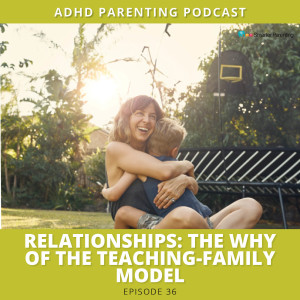
Wednesday Oct 23, 2019
Ep #36: Relationships--the why of the Teaching-Family Model
Wednesday Oct 23, 2019
Wednesday Oct 23, 2019
Smarter Parenting uses the Teaching-Family Model to help parents in strengthening relationships. It’s the “why” of what we do. We want all families to be happy, healthy, and prosperous and to reinforce positive relationships. When strengthening relationships is the goal, doing the work is easy as we understand the purpose.
Learning how to be successful is a skill that families can learn. The Teaching-Family Model gives parents concrete steps that can be used over and over to get the desired results. The Teaching-Family Model teaches parents how to harness success and strengthen relationships and is used by agencies around the world.
The Teaching-Family Model is a specific Behavior Model that helps parents in raising kids so that they can navigate the world successfully as the role of parents is to teach our kids how to function without us.
The five elements of the Teaching-Family Model helps parents understand the Why, When, What, Where, and How.
The Why is the relationships portion. We teach behavior skills because we want to build and maintain strong relationships. The why changes our focus as we ask ourselves, “Is this strengthening or damaging our relationship?”
When tells us when we should be teaching the skills for the learning to be most optimal.
What is the actual steps of the skills. It’s dong the skill “recipe” so we can get the desired outcome.
Where is understanding the relationship and where you and your child are emotionally.
How is Role-playing and is doing the skill. Role-play is practicing so that kids can understand and do the steps of the “recipe.”
Sometimes we need a little help in putting together the five elements of the Teaching-Family Model. That’s where ADHD Parenting Coach Siope Kinikini can help. Using the five elements of the Teaching-Family Model, he will show you what your family needs to do in strengthening relationships.
For a free 15-minute mini-session sign-up today! https://www.smarterparenting.com/coaching/
Learn more about the 5 elements of Teaching-Family Model by visiting Smarter Parenting https://www.smarterparenting.com
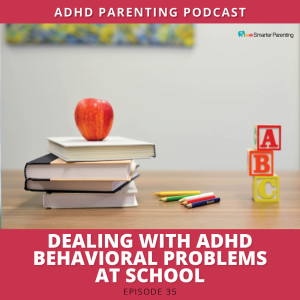
Monday Oct 21, 2019
Ep #35: Dealing with daily ADHD behavior problems at school
Monday Oct 21, 2019
Monday Oct 21, 2019
Getting daily reports about your child with ADHD's constant behavioral problems at school can be frustrating for many parents. These persistent reports of ADHD behavior problems often make us defensive and contribute to feelings of frustration and failure. We may feel that the teachers "have it out for our kid" and that they are being mistreated.
If you are dealing with a situation where you're receiving constant feedback from your child's teacher, especially if that feedback is mostly negative, we recommend doing the following things to help you and your child's teacher improve communication and find success.
First, remain calm and take a step back. Remember that email can mask the true meaning of what someone is trying to say as it can't convey body language or emotion. It can be easy to misinterpret what your child's teaching is trying to say, and that can inflame the situation or add to your stress level. Keeping calm will allow you to begin addressing what's happening positively. Understand that your child may exhibit different behavior problems at school than they do at home and that your child's behavior may make it difficult for them to do their job.
Second, determine what information you need from your child's teacher and how often. For some parents receiving a daily report may be too much, and a weekly report would be better. Other parents having a daily report is beneficial. In addition to determining how frequently you need the report, figure out how detailed you need the information to be. Do you need a summary of every negative behavior or would a checklist of frequency be enough?
Third, set up a face-to-face meeting with your child's teacher to discuss expectations for daily reports. Your child's teachers may think that you want detailed reports. We HIGHLY recommend that you do the meeting face-to-face as it allows you to improve communication and come up with solutions that are focused on helping your child.
Fourth, establish a behavior treatment plan. Getting all this information isn't help if there isn't a plan to address it. Determine consequences and rewards for specific behaviors. Discuss what you're doing at home with behavior skills and invite them to learn the behavior skills on Smarter Parenting so that you're both working together.
Fifth, ask for positive information. When children are continually acting up, it can be hard to remember to find the good. All children need praise and encouragement that they are doing things well. Praising positive behavior is one of the quickest ways to reduce negative behaviors and increase good behavior. Ask your child's teacher to include x number of positive things that your child did in the reports. Doing so will help them better see the good things your child does do! Learn more about how to use praise to improve behavior on SmarterParenting.com.
Remember, the goal is to find a way for you and your child's teacher to work together to help your child find success with their behavior problems at school.
For full show notes and transcripts visit: https://www.smarterparenting.com/adhd-parenting-podcast/
